These vegan mashed potatoes are thick, creamy, light, and fluffy. Featuring dairy-free substitutes, wholegrain mustard, and nutritional yeast, they're a great vegan side dish for anything from regular weeknight meals to Christmas or Thanksgiving.

There are many different ways to do mash, and any chef or home cook worth their salt seems to have perfected their own version. Now I'm throwing my potato hat into the ring.
While the recipe in this post includes my own favourite additions, I'd encourage you to play around with different flavours. Treat this as a handy guide full of tips and variations to help you on your own path to mash nirvana.
If you have leftover mash that you don't know what to do with, try out these vegan mashed potato pancakes.
I create new content every single week. Subscribe to keep in touch and get a free download of The Vegan Kitchen – My Top 10 Tips.
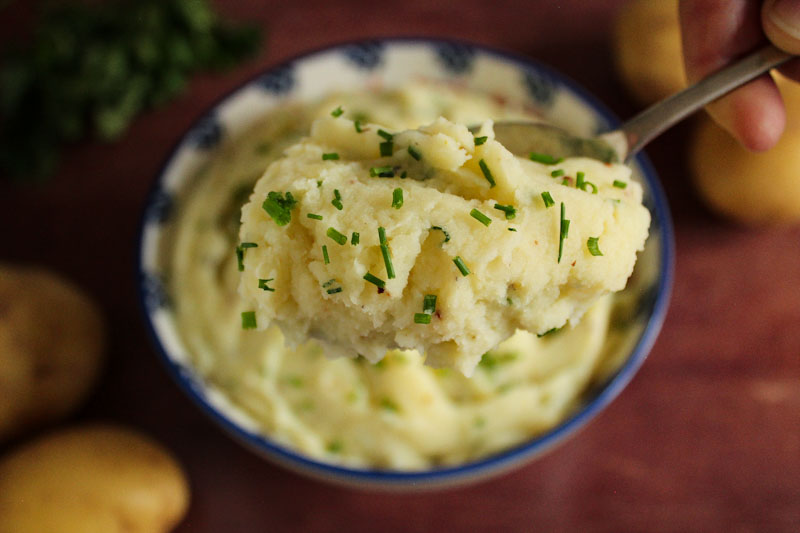
Are vegan mashed potatoes good?
Damn right. As long as you cook the potatoes correctly and use the right substitutes to make them creamy, you can't go wrong with dairy-free mash. I make it all the time, and in fact I've become even more adventurous with flavours since going vegan.
It's a common misconception that giving up dairy means sacrificing your enjoyment of food. If you're curious to learn more, check out these reasons for why people go vegan.
Which potatoes are best for mashing?
When it comes to mashed potatoes, I often use fluffy Maris Pipers. These are a great all-rounder (see also crispy roast potatoes) and readily available in the UK, much like Yukon Golds in North America.
Red-skinned varieties such as Désirée, Mozart, or Laura are also a good choice. Their smooth and creamy flesh works well in mash.
I'd avoid waxy varieties such as Charlotte and Jersey Royals – these hold their shape and are better simply boiled for use in things like salads.
If you're wanting to use sweet potatoes, check out this recipe for sweet potato mash with spring onion and lime.

Should I leave the skins on?
While I often leave the potato skins on in my cooking, I do peel them when it comes to mash. It just makes it creamier. That being said, it's a matter of personal preference and there are plenty of great nutrients that you'll retain by including the skins.
How to make vegan mashed potatoes creamy
In addition to peeling the potatoes, there are many ways to make vegan mashed potatoes creamy. Some people recommend using a potato ricer, but I'm happy enough with a good ol' masher.
When it comes to dairy-free substitute ingredients, there's a lot of scope for experimentation. This recipe uses plant-based milk and plant-based butter to achieve the creaminess of traditional mash, but you could also try products such as vegan crème fraiche or make your own cashew cream.
Which plant-based milk to use for vegan mash?
I'm going to go out on a limb here and say that you could use any plant-based milk for vegan mashed potatoes. Some of my other recipes recommend one type over another, but I think each one would have its own merits in mash.
- Oat milk: My go-to plant-based milk. A good, versatile all-rounder, although not always ideal if you're gluten-intolerant or coeliac.
- Soya milk: This is also a decent all-rounder, and higher in protein than oat.
- Cashew milk: This milk is quite creamy, so would work pretty well in mash.
- Almond milk: I’ve always found almond milk to be a little overpowering, but there are many who advocate for using it in mashed potatoes.
- Rice milk: I haven’t experimented much with rice milk, but I see no reason not to use it. It has a mild taste and might be slightly sweet.
- Coconut milk: I'm talking about the tinned variety, and it's a great way to create an ultra-indulgent version of mash. Just bear in mind that it's very high in fat and saturated fat. You'll also need to stir the contents of the can before adding (you definitely don't want to use a full can).
Note: If you need your mashed potatoes to be 100% gluten-free, be sure to use a plant-based milk that is certified or labelled as such.
Adding nutritional yeast to mashed potatoes
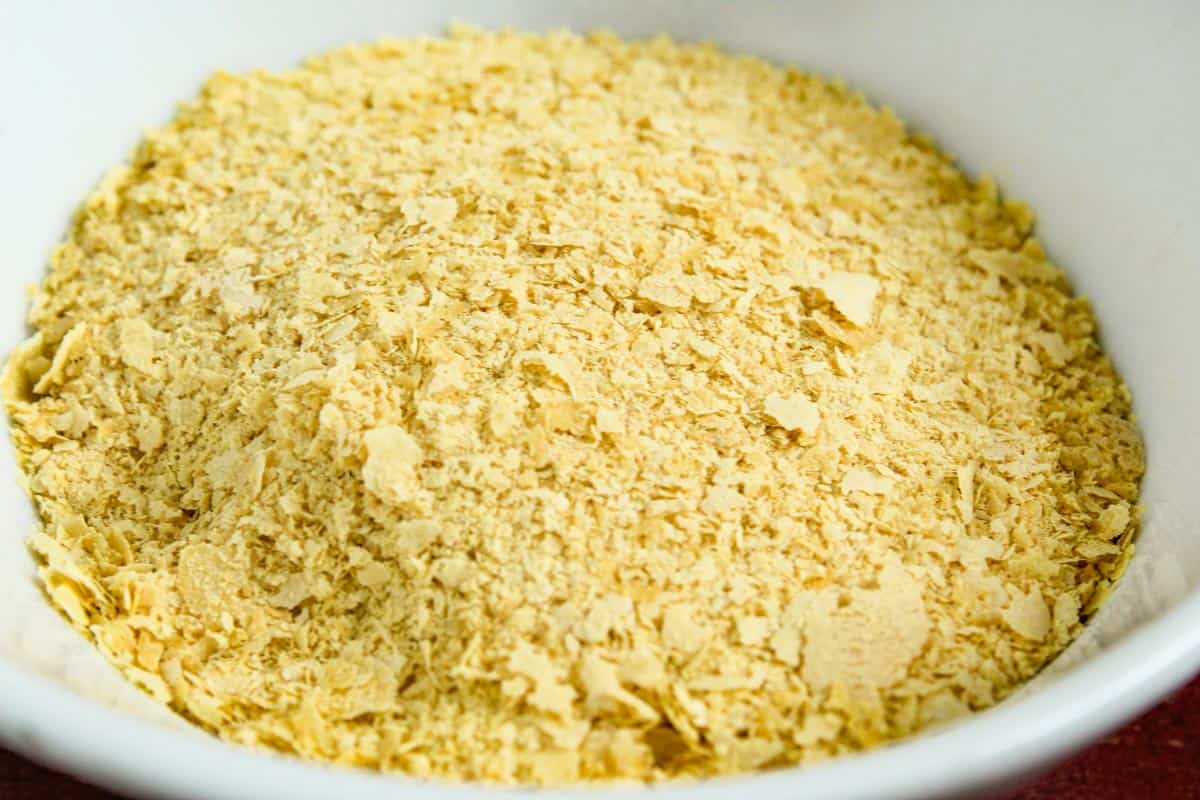
Nutritional yeast or ‘nooch’ is a magical ingredient that lends a cheesy umami flavour to dishes. It is sometimes fortified with vitamin B12 and is a complete plant-based protein, meaning it contains all nine essential amino acids.
It might not be to everyone's taste, but my mash usually gets a sprinkle of it. If you’re new to vegan cooking and want to learn more, check out these other unusual vegan ingredients.
Adding mustard to mashed potatoes
I used to talk about 'normal mash' and 'mustard mash' as if they were separate things. The truth is, I always add mustard to my mashed potatoes and so I've stopped making the distinction.
Wholegrain mustard is my preference, but you can also use Dijon or English. If you're not a mustard fan, just leave it out. If you're unsure, start small and then add more to suit your taste.
Adding roasted garlic to mashed potatoes
Roasted garlic is an incredible addition to mash, but I only add it if I'm already using the oven to cook something else. For example, I don't turn the oven on just to roast some garlic to use with potatoes.
If you want to try it, slice the top off a garlic bulb to expose the cloves, wrap in foil, and roast for around 40 minutes at 200°C (390°F). Squeeze out the soft flesh, discard the skins, and mix through the mash.
How to make mash with olive oil
If you don't want to use plant-based milk and/or butter in your mash, I'd highly recommend trying out extra-virgin olive oil. I love the rich, fruity notes that it gives to the mashed potatoes.
Just be sure to use a good-quality extra-virgin olive oil. Otherwise, you'll be adding lots of fat and not getting much flavour in return. Start with a couple of tablespoons and then add more to suit your taste.
How to make the ultimate vegan mashed potatoes
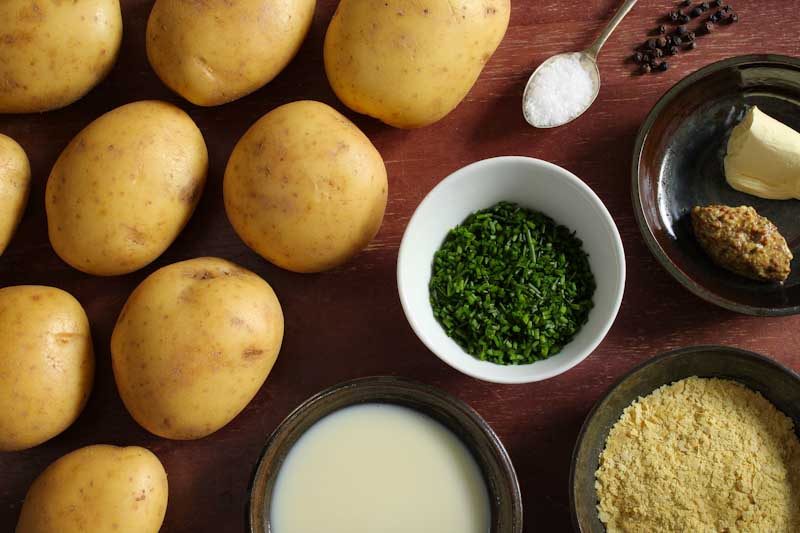
Place the chopped potatoes in a large pan and cover with an inch of cold water. Add a good pinch of salt, then cover with a lid and bring to a boil.

Once boiling, remove the lid and reduce the heat. Simmer for 15 minutes or until the potatoes are soft enough to pierce with a sharp knife. Drain in a colander over the sink, then return to the pan and steam-dry for a couple of minutes.
Next, add the plant-based butter, plant-based milk, mustard, nutritional yeast, salt, and pepper. Mash well with a potato masher.
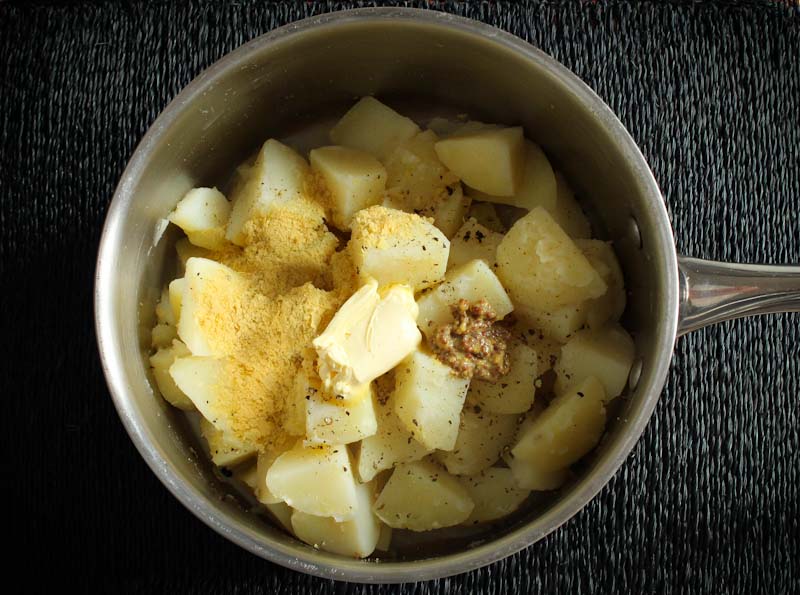
Adjust the seasoning to your taste – more mustard for zing, more nutritional yeast for cheesiness etc. Also, add a little more milk if the mash seems too thick.
Once the potatoes are smooth and well-seasoned, add the chopped chives and mix in with a wooden spoon. Whip up the potatoes lightly to make them extra-fluffy.
Tips for the perfect vegan mashed potatoes
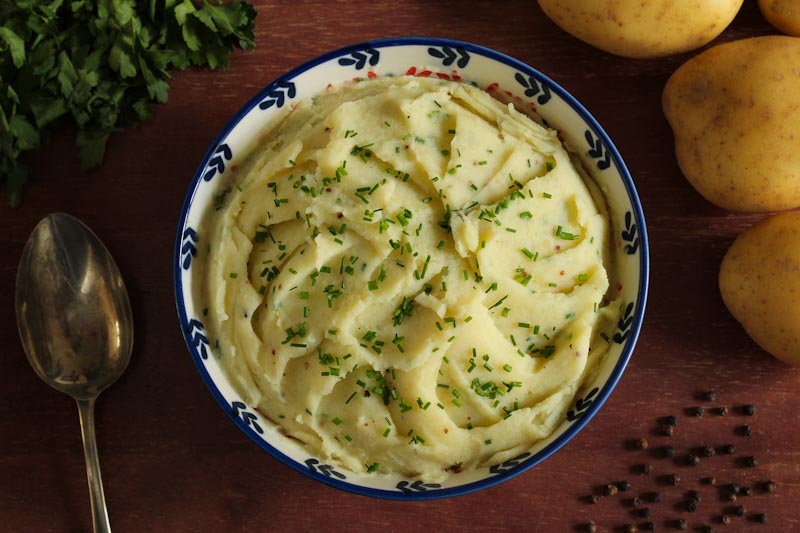
- Use fresh potatoes. If they're a little old, be sure to remove any sprouts and then any dark eyes after peeling.
- Chop into similar-sized chunks. This allows them to cook evenly. I'd say a couple of inches across – you don't want them to be too small.
- Start them in cold water. I'm guilty of sometimes boiling a kettle for speed, but I've found that starting with cold water and bringing it to a boil cooks the potatoes more evenly.
- Add salt to the cooking water. This helps it to reach boiling point and seasons the potatoes during cooking. Cover with a lid to help it reach boiling point, then remove and reduce the heat to a simmer.
- Steam-dry before mashing. Once you've drained the potatoes, return them to the pan (with the heat off) and let some steam escape for a couple of minutes. This stops them from being watery and soggy.
- Don't overwork them. You want the potatoes to be smooth, but after a while their starch can start to go slightly gluey.
- Salt and pepper. Mashed potatoes can take on a fair amount of salt and pepper. Just add a little at a time until you're happy with the amounts.
- Whip after mashing. Once the potato mix is smooth, whip it up lightly using a wooden spoon.
- Add greens after mashing. This is also when I would add the chives, as it helps to keep them intact.
- Cook them 'to order'. They start to lose their nice texture if they've been sitting around for too long, and if they've been stored in the fridge or freezer. They're fine to reheat and eat later on, but if you want them perfect, do them to order.
What goes with vegan mash?
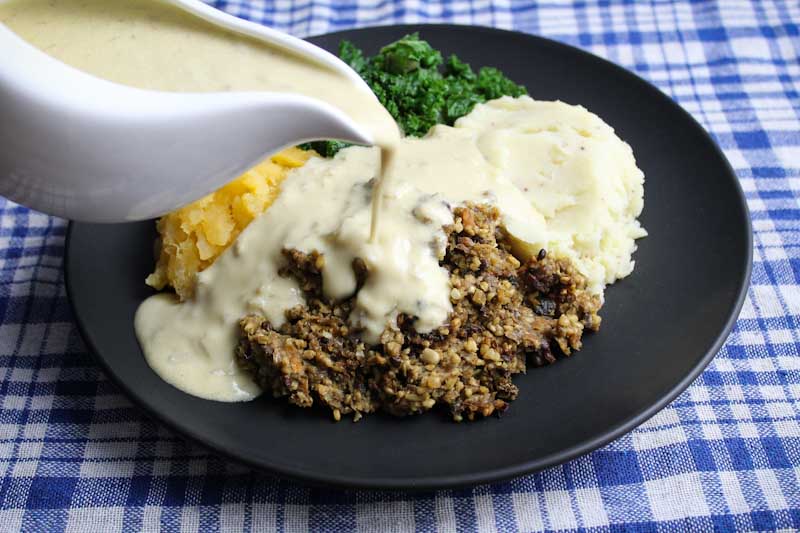
Mashed potatoes are a great side dish in any meal, from regular weeknights to Christmas or Thanksgiving. The real question is, what doesn't go with mash?
If you're looking for inspiration, check out my recipes for the utimate vegan haggis and accompanying neeps and vegan whisky cream sauce. As a native Scotsman, I'm happy to say that these are some of my most popular to date.
Mash is also great with:
...or smothered on top of meaty mushrooms and green lentils like in this vegan cottage pie. You could also stir through some vegan skirlie for a bit of texture and delicious, nutty flavour.
How to store vegan mashed potatoes
Refrigerate: You can store vegan mashed potatoes in the fridge for up to four days. Simply reheat in the microwave.
Freeze: You can freeze this mash for up to six months in containers or resealable bags. Defrost thoroughly before reheating in the microwave.
Keep in touch
Subscribe below to receive a weekly newsletter with my latest recipes. Nice and simple. No pesky pestering. No spam (which wouldn’t be very vegan anyway).
More vegan recipe ideas
If you liked this recipe, you may also enjoy:
- Ultimate Vegan Fish Pie
- Easy Vegan Scalloped Potatoes (Dauphinoise)
- Sweet Potato Mash with Lime
- Crispy Vegan Roast Potatoes
- Cajun-Spiced Baked Potato Wedges
- Leftover Mashed Potato Cakes
- Creamy Vegan Cauliflower Cheese
- Roasted Sprouts with Crispy Vegan Bacon
Full recipe
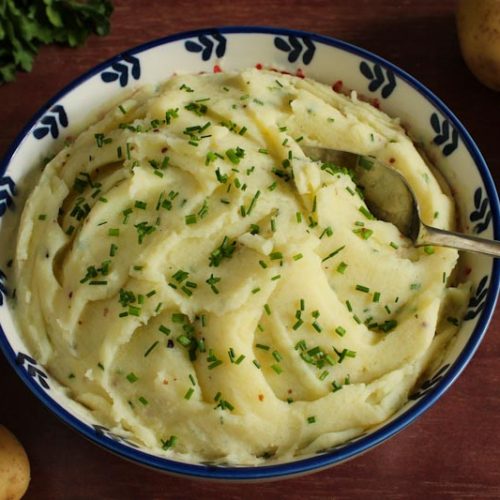
Ultimate Vegan Mashed Potatoes (Tips + Variations)
Ingredients
- 1.2 kg potatoes, peeled and chopped into similar-sized chunks (Maris Piper / Yukon Gold / Désirée – see notes)
- 50 g plant-based butter
- 100 ml plant-based milk
- 1 teaspoon wholegrain mustard
- 2 tablespoons nutritional yeast
- Good handful of fresh chives, finely sliced
- Salt and pepper, to taste
Instructions
- Place the chopped potatoes in a large pan and cover with an inch of cold water. Add a good pinch of salt, then cover with a lid and bring to a boil. (This method is best for even cooking but can take around 10 minutes longer, so just use boiled water from a kettle if you're in a hurry).
- Once boiling, remove the lid and reduce the heat. Simmer for 15 minutes or until the potatoes are soft enough to pierce with a sharp knife.
- Once soft, drain the potatoes in a colander over the sink. Return to the pan and leave to steam-dry for a couple of minutes.
- After a couple of minutes, add the plant-based butter, plant-based milk, mustard, nutritional yeast, salt, and pepper. Mash well with a potato masher (if using a potato ricer, process the potatoes first before adding the other ingredients). Adjust the seasoning to your taste – more mustard for zing, more nutritional yeast for cheesiness etc. Also, add a little more milk if the mash seems too thick.
- Once the potatoes are smooth and well-seasoned, add the chopped chives and mix in with a wooden spoon. Whip up the potatoes lightly to make them extra-fluffy.
- Serve hot and enjoy.
Notes
- Ultimate Vegan Fish Pie
- Ultimate Vegan Haggis
- Easy Vegan Scalloped Potatoes (Dauphinoise)
- Cajun-Spiced Baked Potato Wedges
- Roasted Sprouts with Crispy Vegan Bacon
- Creamy Vegan Cauliflower Cheese
- Vegan Stovies (Scottish Potato Stew)
- Vegan Sausage Casserole
Nutrition
Social follow
🌱 Follow along @thepeskyvegan on Instagram, Pinterest, and Facebook.
Further reading
📩 Fancy keeping in touch? Subscribe to my weekly newsletter.
📖 Find out more about my story.
🍽️ Want to get straight to the food? Hop aboard the recipe train.
🌿 Got a question about veganism? You might find the answer in these vegan FAQs.


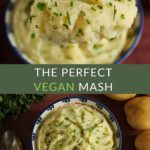
Mike Carrington
Finally a vegan recipe that isn't just 'use plant-based milk and vegan butter'!
The Pesky Vegan
Yep it's nice to be a bit more adventurous with your vegan mash!
Maria
Hi, a bit late to this party but I've only just discovered your blog (now signed up) I think the best addition to mashed potatoes is a good grating of fresh nutmeg, added at the end during the mashing process. I believe this is a tradition from Switzerland and Austria. It enhances the flavour of the spuds in a very special subtle way. I'd avoid buying ready grated nutmeg as it loses its flavour once the container has been opened.
The Pesky Vegan
Thanks very much for the tip Maria - I'll have to give that a go!
vicky
I love this mash!
The Pesky Vegan
Cheers Vicky, thanks for leaving a comment!